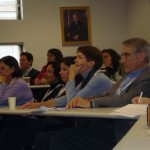California Moves Towards Civil Right to Counsel
 Today California became the first state to establish a pilot program to provide appointed counsel to low-income people in civil legal matters. The program is scheduled to be in effect from July 1, 2011, to July 1, 2017. Low -income people will receive appointed counsel for assistance in critical civil legal matters in areas like disability law, family law, and housing law. California will pay for the program by redirecting a $10 court fee increase that had already been approved.
Today California became the first state to establish a pilot program to provide appointed counsel to low-income people in civil legal matters. The program is scheduled to be in effect from July 1, 2011, to July 1, 2017. Low -income people will receive appointed counsel for assistance in critical civil legal matters in areas like disability law, family law, and housing law. California will pay for the program by redirecting a $10 court fee increase that had already been approved.
I’m excited by this development and wish that more states, including Wisconsin, would establish similar programs. Too many poor people with critical legal needs navigate a complicated system without legal assistance. When parties with critical legal needs are represented, the system is fairer and more efficient.


